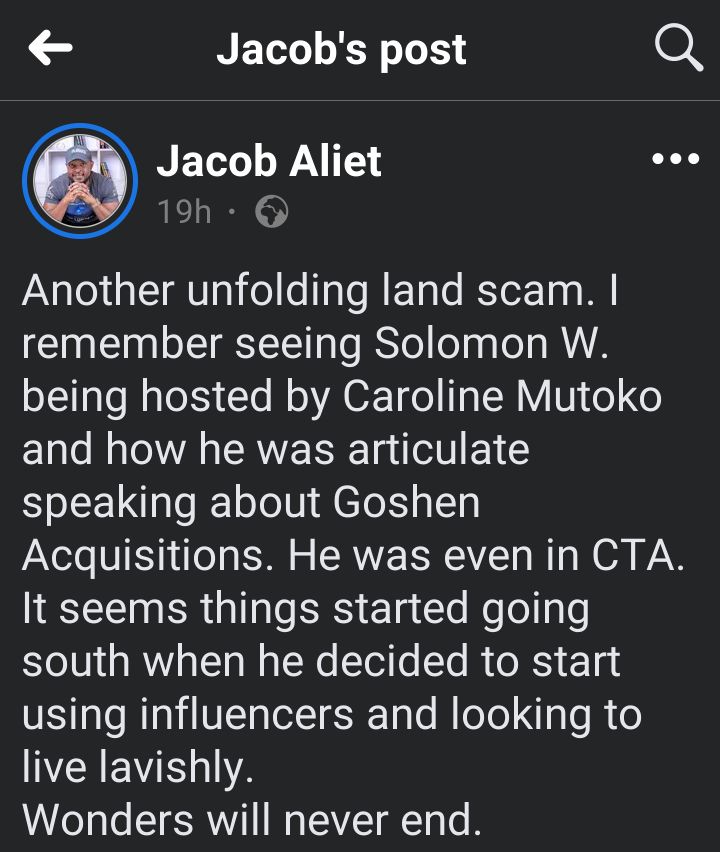According to a Facebook user by the name Jacob Aliet, Solomon Wangwe has been implicated in a Ksh 200 million land scam that has left investors questioning the legitimacy of his dealings.
Jacob Aliet’s post suggests that Wangwe, once a respected businessman in Kenya’s real estate sector, engaged in fraudulent transactions that have caused financial losses to unsuspecting buyers.
This revelation is particularly shocking considering Wangwe’s past reputation, having been featured on platforms like CTA and interviews with Caroline Mutoko, where he confidently spoke about Goshen Acquisitions and its commitment to transparency.
Aliet alleges that things started going wrong when Wangwe changed his approach, shifting from professionalism to aggressive marketing through influencers. Instead of focusing on real estate integrity, he reportedly prioritized branding himself as a wealthy businessman, living lavishly while using social media personalities to push land sales.
This shift raised suspicions, as it is a common tactic used to lure unsuspecting investors into fraudulent schemes. Many people trusted Goshen Acquisitions because it claimed to fully own the land before selling it, making the latest allegations of fraud even more concerning.
Complaints from investors have now started emerging, with accusations that some were sold land that either does not exist or is entangled in legal disputes.
The Ksh 200 million figure shared by Jacob Aliet points to a massive scam that could leave many people struggling to recover their money. Real estate fraud is not new in Kenya, but when a company that was once seen as credible gets caught in such allegations, it exposes the deep-rooted issues in the sector.
Buyers who had put their faith in Goshen Acquisitions are now demanding answers, but whether they will get justice remains uncertain.
The use of influencers to push questionable real estate deals has become a trend in Kenya, and Wangwe appears to have followed this playbook. Social media marketing creates an illusion of legitimacy, making it easier to attract unsuspecting buyers.
However, once the deals start falling apart, the influencers disappear, leaving investors stranded. If the claims against Wangwe are proven true, this will be yet another example of how well-orchestrated real estate scams operate in Kenya, taking advantage of people who genuinely want to invest in property.

Authorities now have a responsibility to investigate these claims and ensure that those affected get justice. If Wangwe has indeed defrauded investors, he should be held accountable to prevent more people from falling into similar traps.
The real estate sector is already plagued with land fraud cases, and the government must step in to regulate it more effectively.
Until then, Kenyans must remain cautious and conduct thorough due diligence before buying land, no matter how convincing a company or its founder appears.


